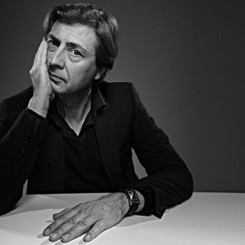Last week it was announced that Jérôme Sans is to be replaced as Director of the Ullens Centre for Contemporary Art, a post he has held since early 2008, by Leap magazine’s Editorial Director Phil Tinari in December.
Sans came to UCCA with a strong international background in art and management. His curatorial and promotional activities include founding and co-directing the Palais de Tokyo in Paris, co-curating at the Lyon and Taipei Biennales and acting as Cultural Curator for Le Méridien Hotel group. Sans has realised an active exhibition program at UCCA which has seen spectacular shows by the likes of Zhang Huan, Liu Xiaodong and Qiu Zhijie occupy its Bauhaus factory space in Beijing’s 798 art district. He is also responsible for the Curated By… series there, which invites mature artists to arrange and direct exhibitions by emerging names. His departure arises amid a lack of clarity surrounding the future and structure of the organization.
Randian’s Iona Whittaker spoke to Sans shortly before, and just after, the news was announced. He responded with characteristic candor.
Iona Whittaker: Jérôme Sans, how and why did you come to be in China and at UCCA (Ullens Center for Contemporary Art)?
Jérôme Sans: I keep saying that life is a boomerang. This brings me back to 1985, when I met Yan Peiming for the first time; a few months later I had the chance to meet Chen Zhen who had just arrived in Paris, and from that point I had a very strong relationship with this first generation of Chinese artists. Later came Wang Du, Huang Yongping, Gu Wenda, Shen Yuan, Cai Guoqiang — all those guys. At that time, no one in Europe was looking at contemporary Chinese art and I understood the importance of their difference in attitude and vocabulary and the language they were using to completely reinvent our modernity.
Three years before the opening of UCCA, I was invited to the first Beijing art fair to be a panellist; I came here with Wang Du, and I asked him to take me to see some galleries. We went to 798 where there was still mud on the floor, very few galleries, no bars, nothing. Walking down an alley we met Fei Dawei, who was working on the setup for the place for Ullens, and we went into this place and looked at it, and we said ‘‘Wow, this has fantastic potential.’’ In January ’08, I received a phone call: ‘‘Mr. Ullens is coming to Paris, are you here?’’ I said ‘‘Yes, I’m here.’’ We met for lunch, and they told me they were looking for someone to help give the UCCA direction and an identity.
IW: So you never expected to become a curator?
JS: I understood at the age of fifteen that my only charisma was to understand others faster than themselves and to have the energy to orient people who have some doubts or uncertainties about what to do, to give them the power to believe in their work and direction. I chose visual art because at the time it was something very underground; there were very few people, on their own, supporting artists and contemporary art.



